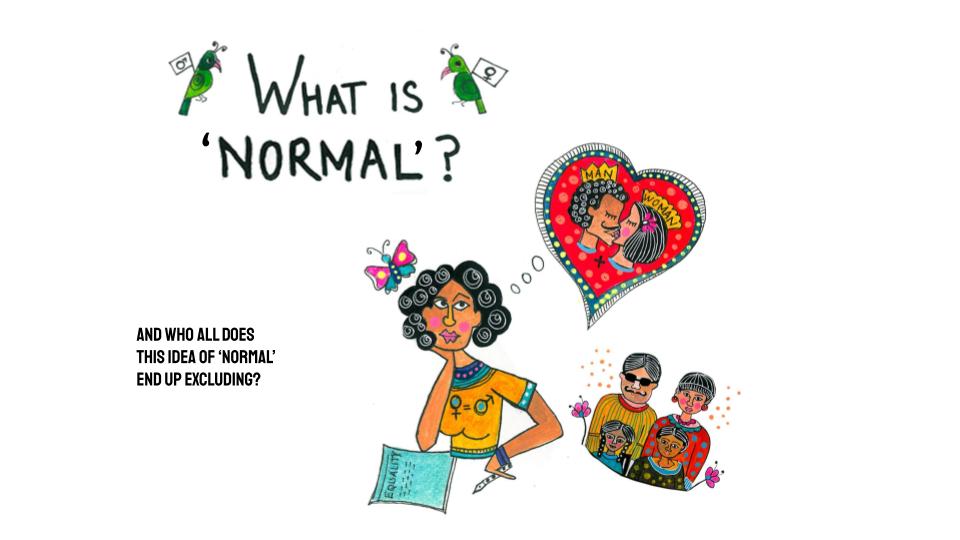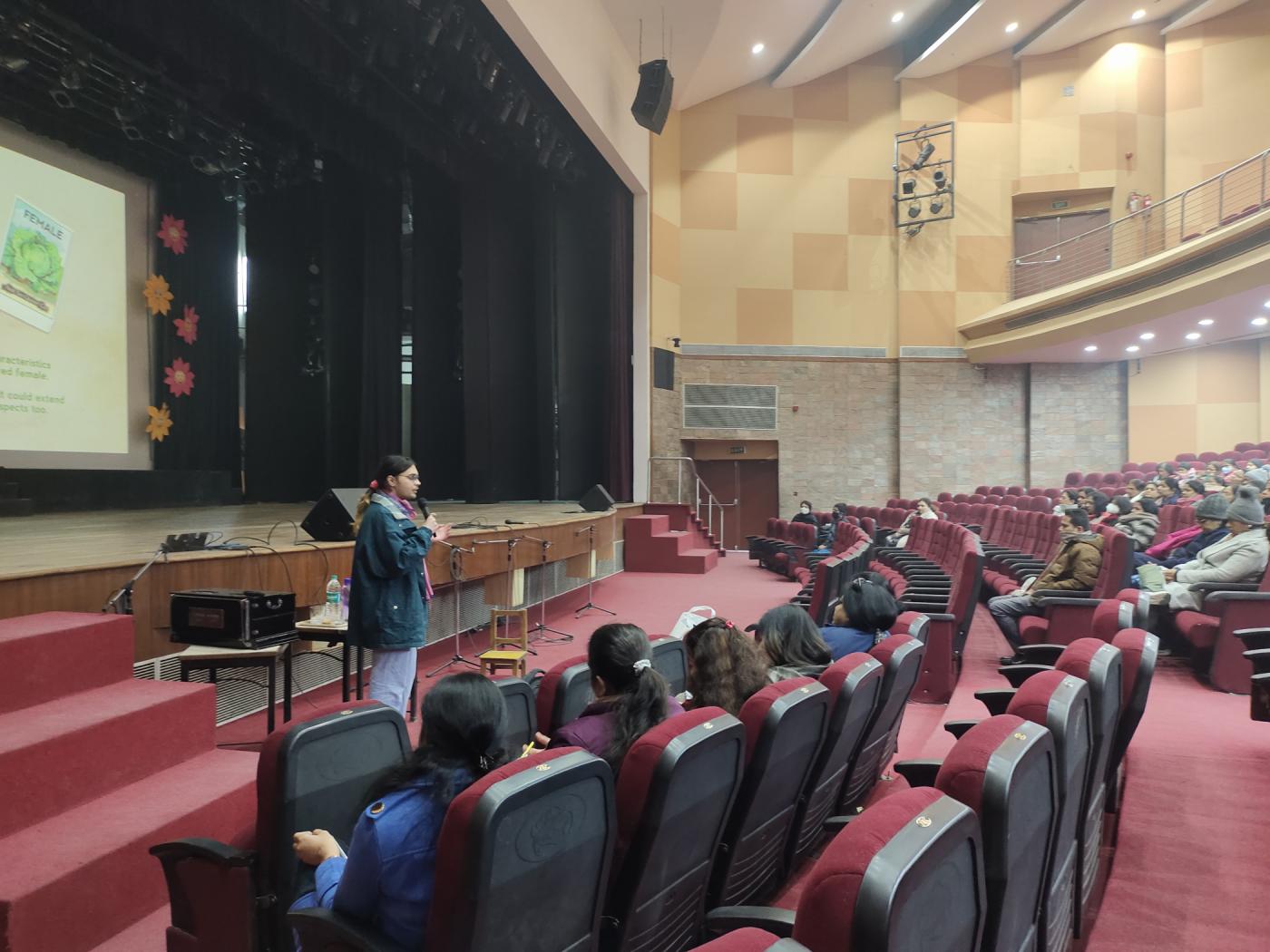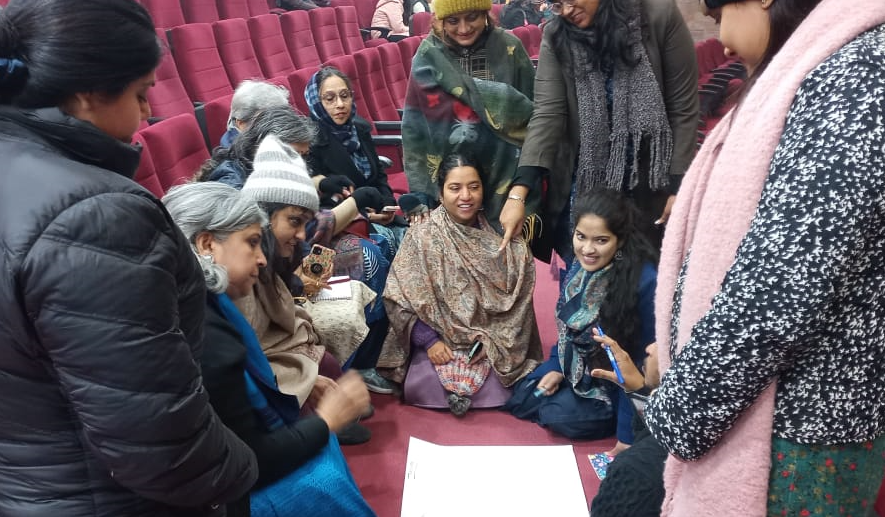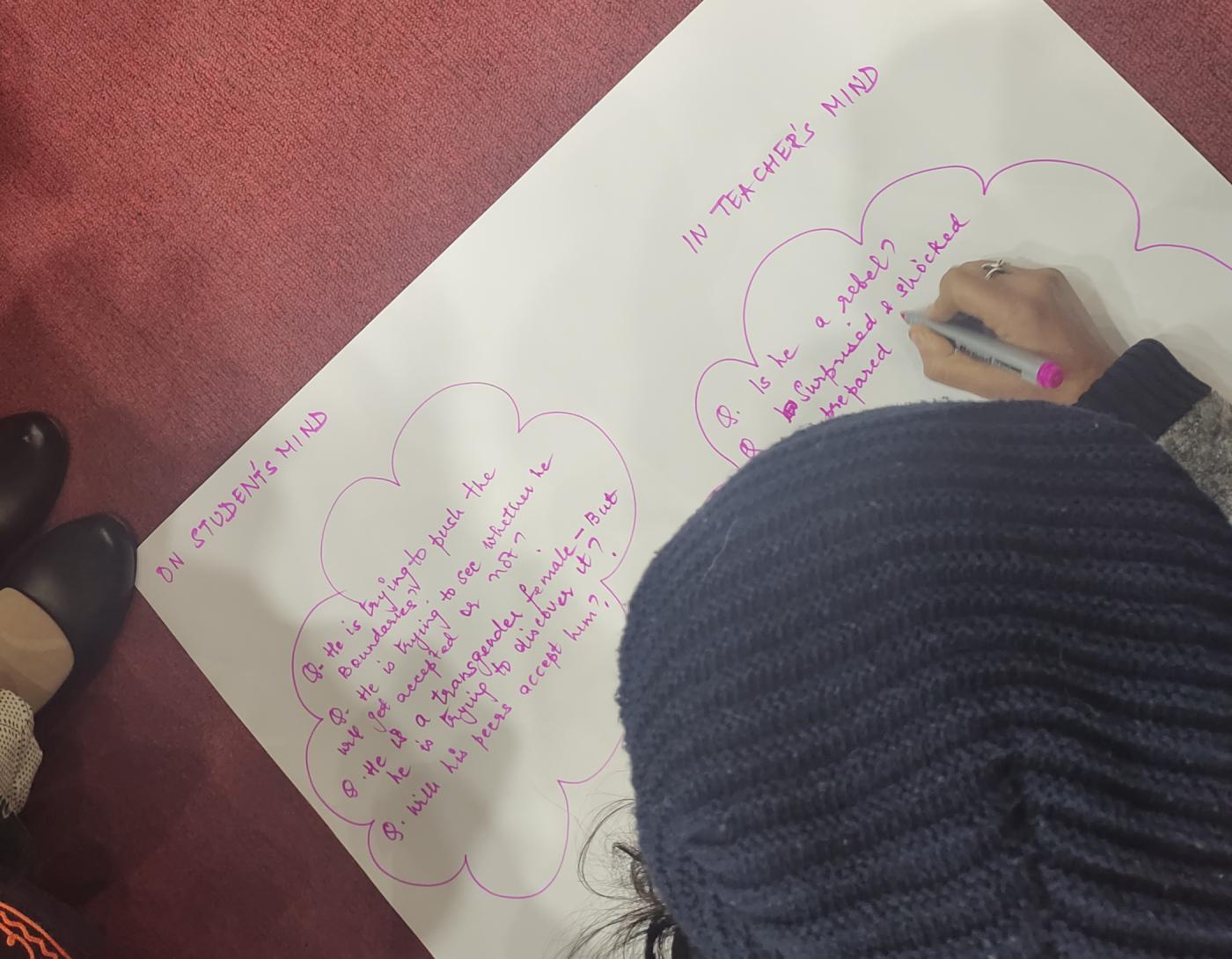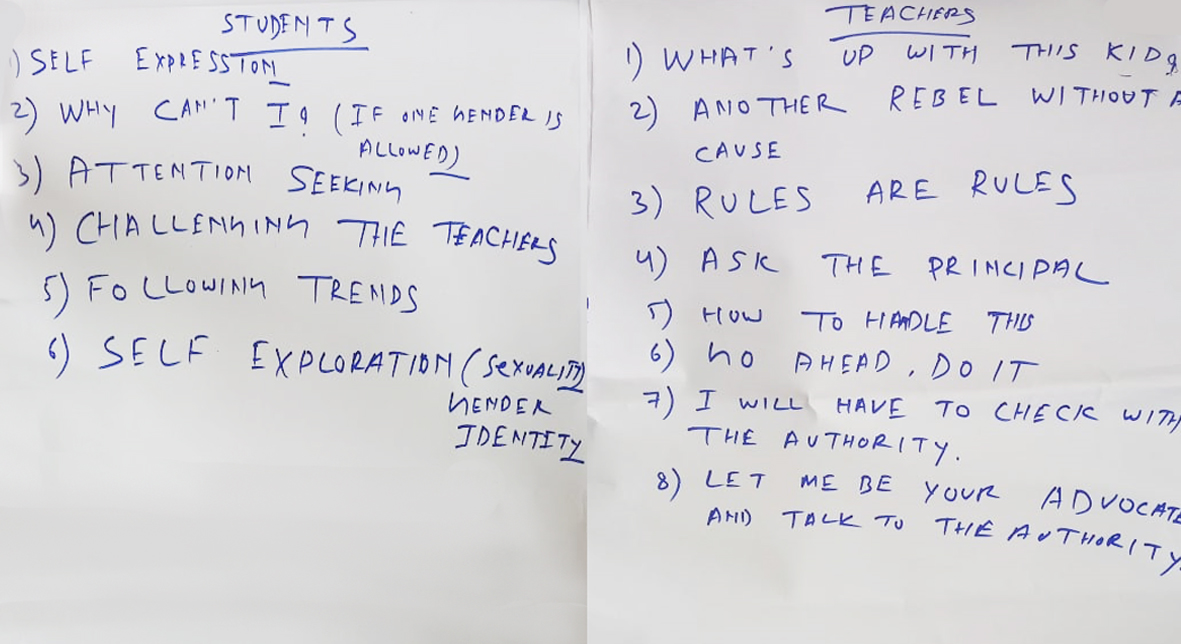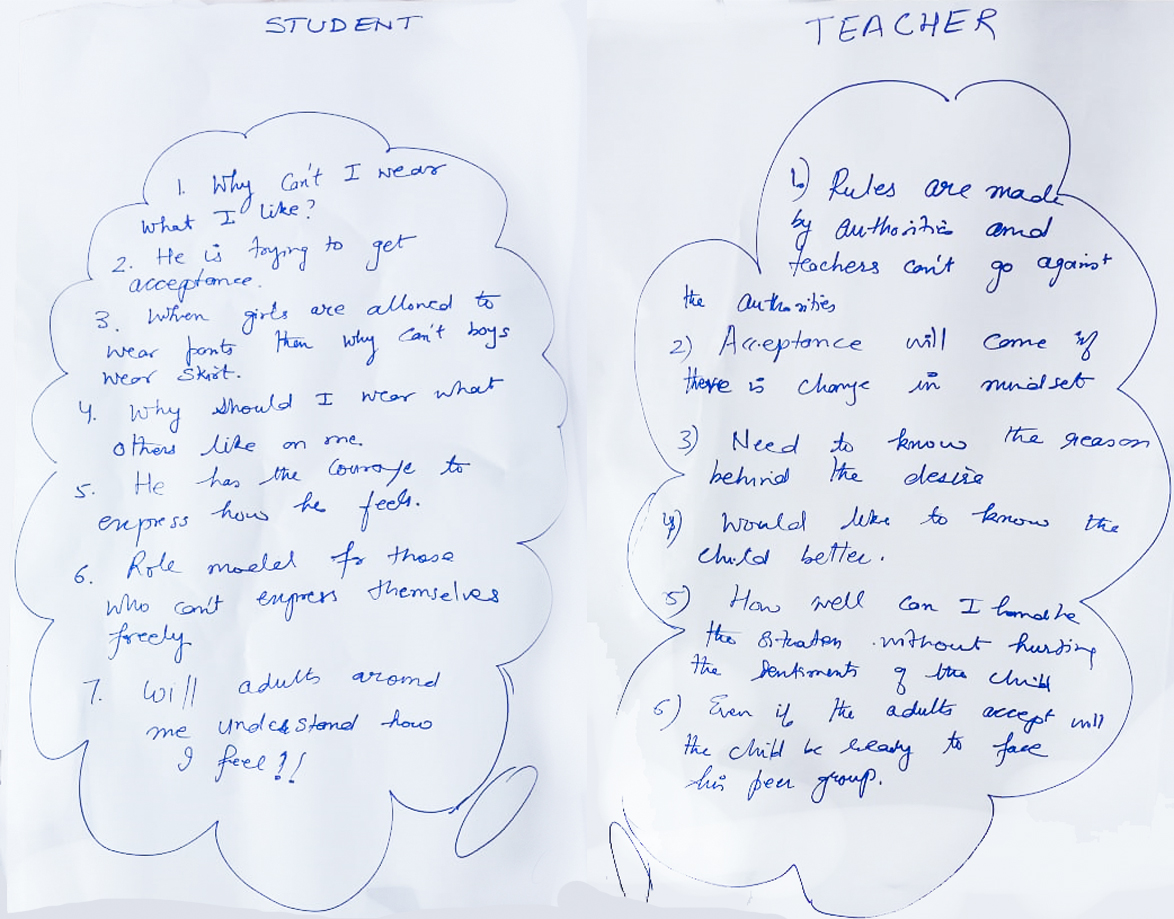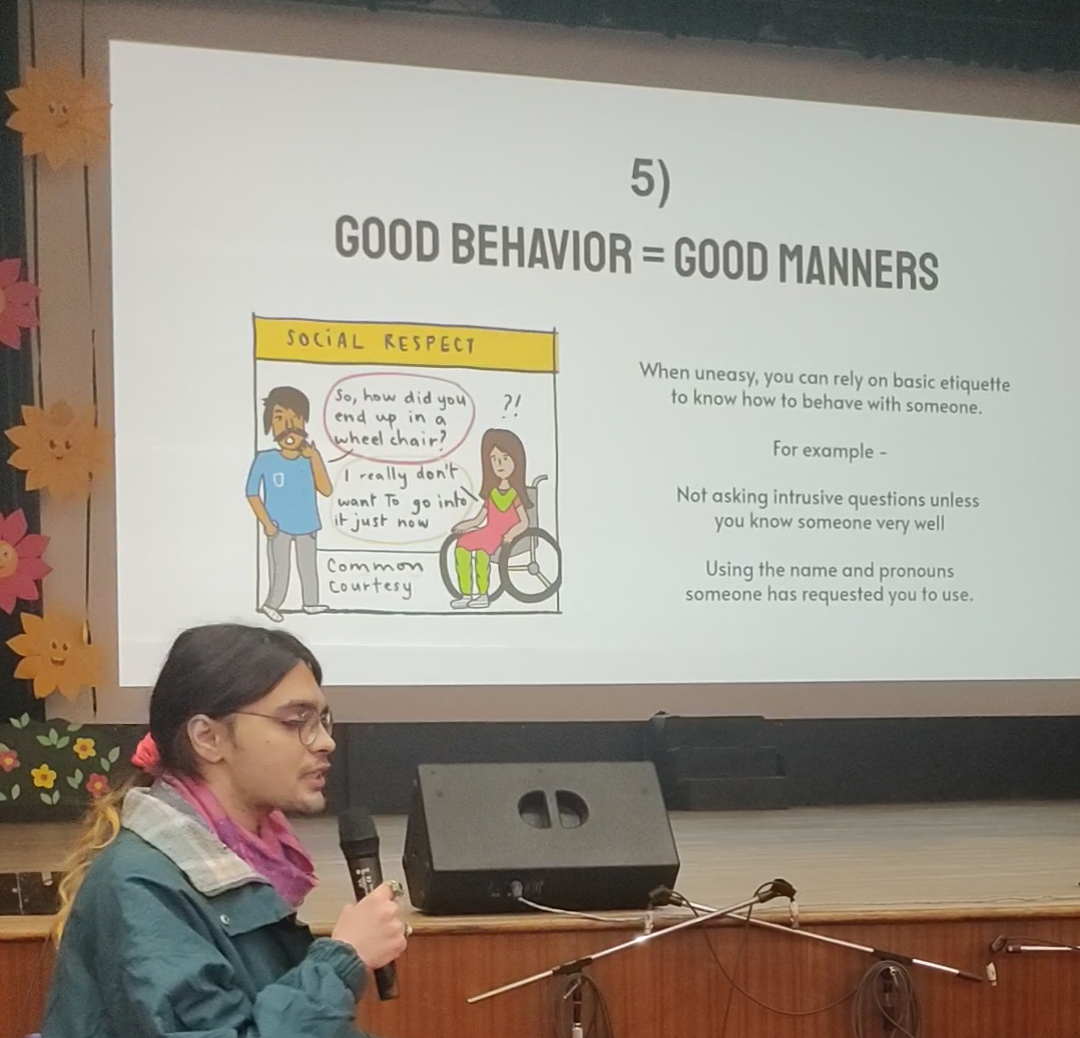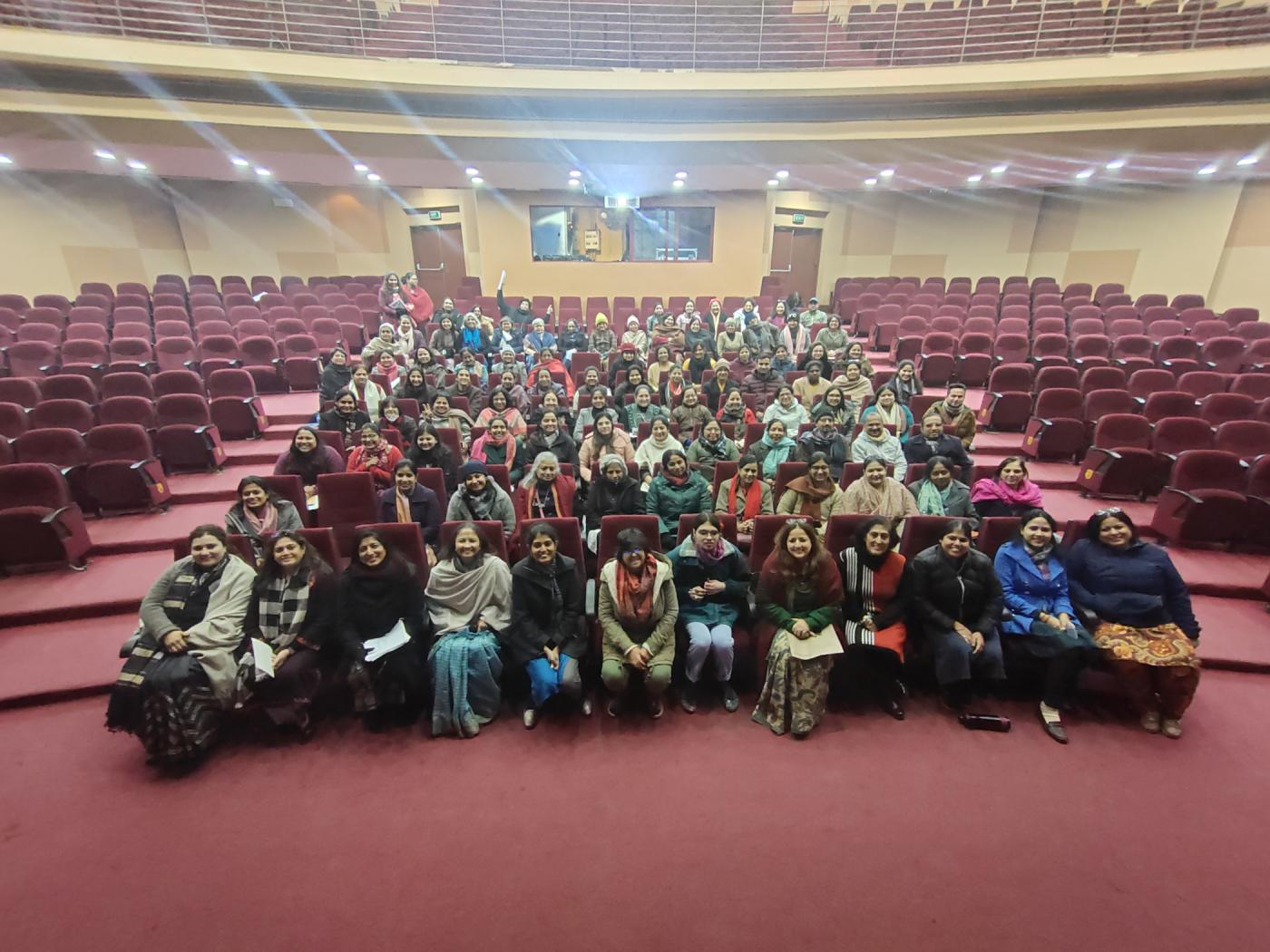In continuation of our work with educators who want to address the need for sex education in educational institutes so as to better equip their students for adulthood and self-exploration, Agents of Ishq hosted a sex, gender and sexuality workshop with 100+ middle school and senior teachers at Sanskriti school in Chanakyapuri, New Delhi on the 9th of January 2023.
Many questions that were raised in our previous collaboration with
Gender Lab’s “How We Raise Our Boys” workshop series with educators
(the result of which was a teacher’s manifesto which you can read here)
were picked up and explored yet again in this workshop, bringing out
the concerns and interests of Indian teachers - and the students whom
they treasure!
AOI’s workshops are designed to create a space for questions and conversation while sharing information in a non-prescriptive manner. This allows us to co-create in a step-by-step way, solutions that are contextual, not normative. One of the many ways in which AOI disseminates sex education is to continuously work with educators who want to address the need for sex education in their respective institutes. - especially in the absence of CSE in schools. It also helps us understand their experiences and the factors they take into consideration when they interact with students in their journey of adulthood and self-exploration.
Recognizing the need for teachers to be more sensitive about diverse genders and sexualities, Sanskriti School had invited us to give their teachers not just the basic gyaan about sex/gender sexuality but also discuss some of the situations they face practically as well. In the shivering Delhi ki thandi, what emerged was not just a need for information but the warmth of teachers who were motivated to support their students better.
Before going into any fundas about gender and sexuality, we asked everyone a question about the role gender has played in their own lives - If the gendered restrictions did not exist while you were growing up, how would your life have been different?
The answers ranged from “I would have worn Mehendi on my hands more openly or worn flowers in my hair” to female teachers saying, “As a woman, you are expected to love feeding people. if I had a choice, I wouldn’t have cared about cooking at all” or “I would have been more ambitious. I became a teacher which was the most obvious and safest job option for a woman. My father told me to explore more but I never imagined being more ambitious as a girl”. A lot of anecdotes emerged along with frustration about double standards for girls and boys about coming home - “Even as a Masters student, when I returned late I would see my father pacing in fear waiting for me”, or about men not being taught how to cook, clean or nurture relationships the way women are taught to do it and much more. From the get-go, we knew one thing - gender roles hurt all of us in more ways than one!
CHAPTER 1 - CLARIFYING THE BASIC FUNDAS
Our first session was a Sex and Gender 101 - an introduction to how society is structured along heteronormative lines which exclude all of us in different ways. We explained what sex is, what gender is (and the difference between the two), the many gender identities out there, what being transgender means, different kinds of sexual orientations, and more.
The questions came flooding in, some of which include:
“I always thought that if you’re a hijra, then it means your body is different?”
“If a baby is born with a deformity, should we not fix it?”
“Is it true that hijras demand to see a baby once its born and they will take the baby away if its body is not normal?”
“What is the difference between genderfluid and nonbinary?”
“Can you be a trans man and gay at the same time?”
“When someone says they are bi, does that mean they are experimenting?”
“How can you be queer and be a virgin? Don’t you have to have sex to know your sexuality?”
As teachers, you are expected to have the right answer to everything. But who helps teachers update their knowledge on gender and sexuality in a rapidly changing world? The questions, which never stopped coming even in the chai and samosa break, were a testament to the gap of knowledge that exists as well as the teacher’s motivation and the curiosity to know more and answer some of these basic questions in their heart. And we were glad to have created that space where teachers felt they could ask these questions without feeling judged!
One of the first questions that came up while discussing sexual orientations was “A student came up to me and said they’re bi. But I don’t know why they need to tell me that? I’m not sure what the student is expecting of me?”. It wasn’t just facts and definitions that the teachers wanted - they were also looking to figure out how to respond practically in moments like these and show support to students who confided in them.
Apart from making it a forum to understand the basics of sex and gender, we naturally progressed to talking about how teachers can come to terms with new understandings of sexual identities that have emerged over time and support students exploring the same. The teachers had a lot of concerns about understanding different needs and ways of expression among students, and the reasons and thought processes behind students’ experiences and expressions. To create a safe space to bring up these dilemmas that we knew the teachers must be facing, we did a role playing activity.
CHAPTER 2 - QUESTIONING THE RULES, STEPPING INTO THE STUDENTS' SHOES
We gave the teachers a scenario - “A boy student approaches you and says they want to wear a skirt to school instead of pants. As a teacher, you don’t know what to say because technically it’s against the rules.” We asked the teachers to split into groups of 10 and respond to this scenario from two perspectives - both of the student, and the teacher. The point of this exercise, rather than to speculate what should be done, was to put themselves into the shoes of the student and the teacher and to simply list out what might be going on in their heads and hearts - the thoughts, the feelings, the anxieties, the questions, the fears, and the discomfort.
Turns out, this wasn’t just an imaginary scenario - this was a real situation that they had actually faced before in their classrooms, among many others!
Initial reactions of many teachers was a fair amount of doubt about whether asking to wear a skirt is disruptive or attention seeking behavior from a student. There was doubt about whether these were genuine needs or whether students simply wanted to do nakhra and rebel against the system.
Slowly, the teachers also brought up more possibilities of what might be going on in a students mind -
“Maybe the student wants to wear a skirt at school because they want to express themselves in a safe space first, before they feel confident to do it out in the world.”
“Maybe the student is asking on behalf of a friend, who is too shy to ask.”
While some recognised their students’ need for self expression and exploration, others were apprehensive about the possible difficulties students might face for showing up to school dressed “differently” - “What if some students start challenging the uniform code and get bullied for it? What if the parents are against it? The school administration might also have problems with it, as they will purely see it as dress code violations. If we allow students to play fast and loose with uniform, how will we maintain discipline in school?”
As they discussed school rules and rule breakers, we asked them - “What is the purpose of a certain rule? What is it trying to accomplish? What does discipline really mean to us?” Soon, teachers began to think of rules in a different way, and the discussion turned to strategies they can use to negotiate between a student’s needs and the larger systems at work in school - administration, parents, society ke norms and expectation, and so on.
One of the biggest challenges the teachers could all agree on was that of changing the larger system and society. The teachers said “We want to bring up these changes and topics, but one way or the other the news reaches the parents. Even changing uniform policies would need us to sensitize the parents as well as the administration, the school board, principals and other higher ups involved.”
Teachers want to create a safe space for students but how to protect them from the social stigmas existing in the larger world outside school? As one teacher said - “Students need to learn how to deal with a “no”. Indulging them too much right now will not prepare them for the real world. Tomorrow if they work in an office with a dress code or apply for the army, how will they cope with the restrictions?”
As teachers listened to each other’s concerns and apprehensions, they realized the need for some sort of collective understanding and action -
“I feel there needs to be a cohesion in how teachers respond to these situation - because one teacher might approach the situation differently from another so the students might be getting conflicting messages.”
Changing the system seems like too large a project to embark on, but the teachers agreed on one thing - they needed more open forums like this to talk about this to each other.
CHAPTER 3 - TEACHERS HAVE SEEN EVERYTHING
This workshop brought out into the open the plethora of dilemmas teachers are actually exposed to. As one teacher laughed and said “Teachers have seen everything.”
Some teachers had seen how limited ideas of gender affect students who are even a little different - “There was a student who was very effeminate and had gotten progressively very isolated from everyone else in class. But he was very talented in singing, dancing and performing. When the annual talent show came along, he participated in it and it helped greatly because people started knowing him and he wasn’t going unnoticed as a person by his peers afterwards.”
Some teachers wanted practical solutions for their everyday dilemmas, because there are more and more openly queer and trans students in school now and we need to think about their needs seriously - “One student ticked the third gender box when we were planning a school trip. Where should we put this student on the trip? In the girls rooms or the boys rooms? If we give special treatment to one person, what if others demand it too?”
Some teachers had seen how simply giving gyaan on sex and gender is not enough to make school a safer space for queer students - “When we taught students about basics of gender/sexuality, it ended up increasing bullying among students because they started teasing other kids ki - Oh look those two must be lesbians. How do we get them to respect each other’s privacy?”
They brought up the need for a long term and consistent effort to talk about gender sexuality in a wholesome and empathetic way - one that gives students the privacy and freedom they need as they explore themselves and start thinking about what it means to be an adult.
Some teachers were also hopeful of a better world. “I came to know that when a 7th grader asked their parent “If I like another girl, will you hate me?” The parent responded, As long as you don’t hate anybody, it’s all right”
All throughout the workshop and afterwards as well, even though sometimes it felt like the problems were too big, too systemic to ever have a solution to or that it was maybe too much to ask of teachers to deal with their students gender/sexuality when they might be struggling to even complete their syllabus - in spite of all the obvious challenges and resistance we could have faced because of this topic, there was a palpable sense of relief among the teachers that they had discussed this and brought it out into the open. “It's high time we talked about these things na?” said one teacher as we left. Among all the questions and dilemmas, one thing was clear - teachers are very invested and interested in their students' well-being. And they’re definitely willing to go out-of-syllabus to give students the support they need, as long as they get the support and resources to do this too!
At AOI, we are here to support teachers who want to equip themselves with more knowledge to support their students! It was really affirming to see 100+ middle and senior school teachers show up and get involved and learn and look out for their students with us. It was clear that these teachers were genuinely concerned for their students and were passionately trying to give their students respect, choice and agency while contending with the regulations and values of the larger system.
We hope that we can continue building this thoughtfulness and co-operative structure as we continue our engagement!

